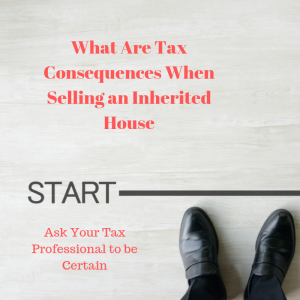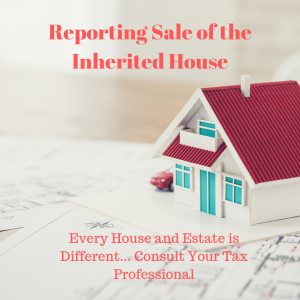 Figuring out the tax consequences when selling an inherited house in Stockton is best left to the professionals. You might owe an estate tax, an Inheritance tax and or a capital gains tax,
Figuring out the tax consequences when selling an inherited house in Stockton is best left to the professionals. You might owe an estate tax, an Inheritance tax and or a capital gains tax,
The relevant tax laws may appear to be fairly straightforward, but they can get complicated when you factor in your income, the size of the inherited estate and the capital gain that was realized. The best way to decipher any inheritance is to schedule an appointment with a certified public accountant or a Tax Attorney to explain the impact upon your personal taxes.
Understanding the cost basis there are one time exemptions and other legal maneuvers like the use of a 1031 exchange that can lessen or eliminate altogether the tax bite. In my experience, it doesn’t always mean that there is a taxable event. There are so many mitigating factors, that it doesn’t make sense to try and navigate the legal conditions and nuances by yourself and risk missing something that could actually save you money.
While you would think that if you inherited a house you would automatically have a gain, and thus owe additional taxes, you may be surprised. Sometimes the tax code is such that your gain may actually be a net loss depending on the cost basis and you may have a tax deduction. Your actual situation may differ greatly from the next persons based on so many factors including your income, the size of the estate, your tax bracket and other factors that determine taxable events.
 During the Probate process in California every estate is assigned a Probate Referee. It is their job to establish the value of the estate, Sometimes the estate is worth less than $150,000 and can be fast tracked. Generally speaking, estates that are valued under $150,000 face very little tax consequences and are ushered through an abbreviated probate process. Larger estates need to go through the full blown Probate and as such the cost of the probate is more as are the potential tax consequences.
During the Probate process in California every estate is assigned a Probate Referee. It is their job to establish the value of the estate, Sometimes the estate is worth less than $150,000 and can be fast tracked. Generally speaking, estates that are valued under $150,000 face very little tax consequences and are ushered through an abbreviated probate process. Larger estates need to go through the full blown Probate and as such the cost of the probate is more as are the potential tax consequences.
The Executor of the estate can also seek legal and tax advice to help the heirs determine the best financial course of action when selling an estate. Unfortunately, some estates dont have enough cash on hand to allow the heirs any flexibility and require the house and other assets to be sold in order to pay for that process.
So, What Are the Tax Consequences When Selling an Inherited House in Stockton?
Estate Tax
State and federal estate taxes might also be due. In 2018 the federal estate tax exemption became $11.18 million. An estate won’t owe any estate tax if its value is less than this.
If the estate owes state estate taxes, these taxes must be paid before you can receive your inheritance. The amount that you receive will most likely already have been reduced by the taxes that were due.
Inheritance Tax
You probably won’t have to worry about an inheritance tax, either, because only six states collect this tax as of 2018: Iowa, Kentucky, Maryland, Nebraska, New Jersey, and Pennsylvania. If the decedent lived or owned property in any of the other 44 states, you can collect your inheritance without of an inheritance tax—even if you live in one of these six states.
Capital Gains Taxes
 The tax consequences when selling a house inherited in Stockton include being subject to capital gains taxes. Capital gains or losses are those that stem from the sale of items you use for personal or investment purposes, such as stocks or a house. So for income tax purposes, the sale of an inherited house in Stockton is treated as a capital gain or loss.
The tax consequences when selling a house inherited in Stockton include being subject to capital gains taxes. Capital gains or losses are those that stem from the sale of items you use for personal or investment purposes, such as stocks or a house. So for income tax purposes, the sale of an inherited house in Stockton is treated as a capital gain or loss.
The catch with selling an inherited house is that a gain or loss is considered a long-term gain or loss. Further, losses on personal property cannot be claimed as a tax deduction. So if you ever used the inherited house as your personal home, it became personal property, and you can’t deduct a loss if you sell it.
Reporting the Inherited House
In many instances, the executor has to file an estate tax return to report the inherited house. But this is only if the estate exceeds the inflation-adjusted exemption amount.
The determination of the gain or loss on a house sale depends on the “basis” of the house. As the basis goes higher, the taxable gain from a sale decreases. There are, however, different rules for the sale of an inherited house that allow for a special stepped-up basis.
“Basis” Determination
The cost basis of the house depends solely on the date of death of the decedent. Your cost basis is dependent on the fair market value as of that date. What this means is that the capital gains taxes you owe are based on gains above the property value at the time of the decedent’s death – not what the decedent paid for the house.
If you never lived in the house and if it sells for less than what the fair market value was at the time of death, then you have a deductible loss. It is important to note that only $3,000 of these losses can be deducted in any one year against your ordinary income. Anything above that $3,000 will have to be a loss carry forward over the next several years.
Reporting Sale of the Inherited House
 When you sell an inherited house, you have to report the sale on your federal tax return. To calculate the gain or loss, you have to subtract the cost basis from what you received for the sale. You should be able to go through your probate documents to determine actual cost basis. The probate referee more that likely performed a mandated appraisal of the house at the time of death of the decedent and submitted it to the court. The Title Company is also required to send you a 1099 for the proceeds of the sale at the end of the year. You can always call the title company to get a copy of the final closing documents.
When you sell an inherited house, you have to report the sale on your federal tax return. To calculate the gain or loss, you have to subtract the cost basis from what you received for the sale. You should be able to go through your probate documents to determine actual cost basis. The probate referee more that likely performed a mandated appraisal of the house at the time of death of the decedent and submitted it to the court. The Title Company is also required to send you a 1099 for the proceeds of the sale at the end of the year. You can always call the title company to get a copy of the final closing documents.
To report the gain or loss, you need to use the standard IRS Form for this purpose, on a Schedule D. You also have to include the gain or loss on your personal Form 1040 tax return. And make sure you use the Form 1040 (and not the Form 1040A or Form 1040EZ) for the year in which you sold the inherited house.
The tax consequences when selling a house inherited in Stockton can be complex and difficult to understand at best. It’s usually a good idea to find a professional to help you navigate the tax waters.
If you are interested in selling an inherited house will be glad to answer any questions. If you would like a Fair market value offer minus repairs Contact us by phone at (209)481-7780 or fill out the online form.
There are many misconceptions about taxes and inheritances. Consult with a tax attorney or an accountant for information regarding your tax return especially if you’re not sure if you’ll have to pay taxes on inherited property.
The information contained in this article is not tax or legal advice. State and federal laws change frequently, and the information in this article may not reflect current Federal or California laws or the most recent changes to the laws. For current tax or legal advice, please consult with an accountant or an attorney.

